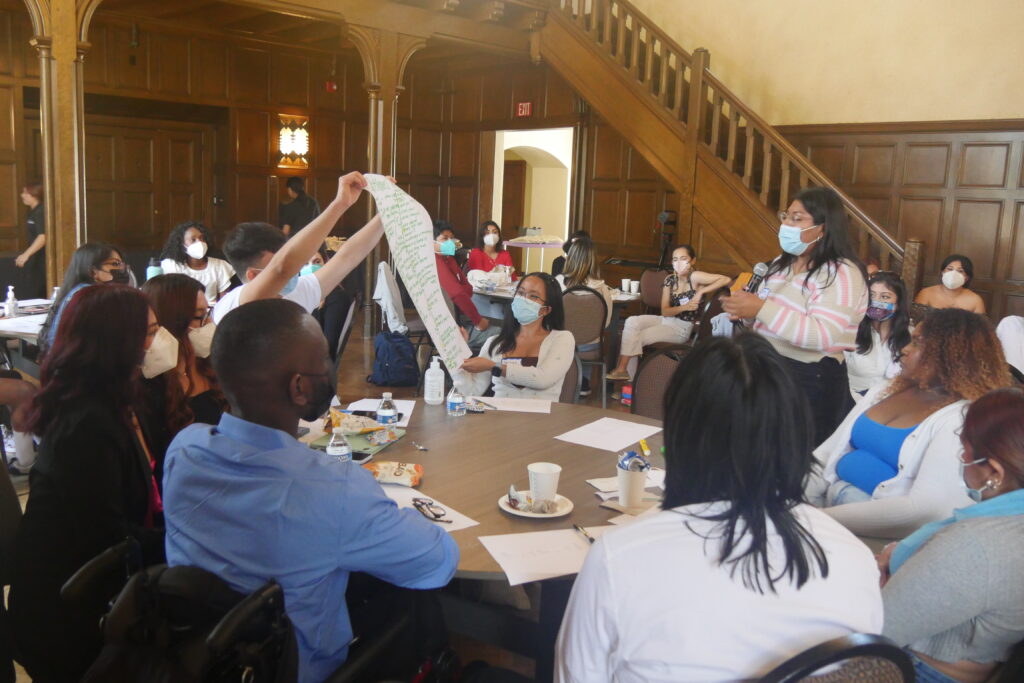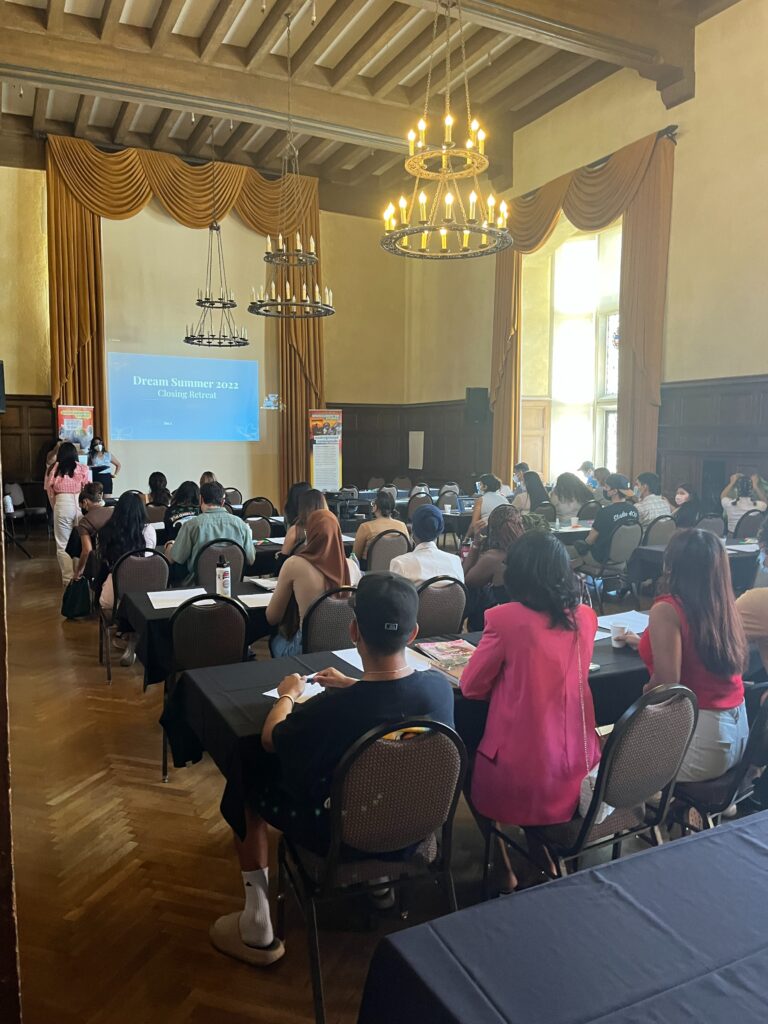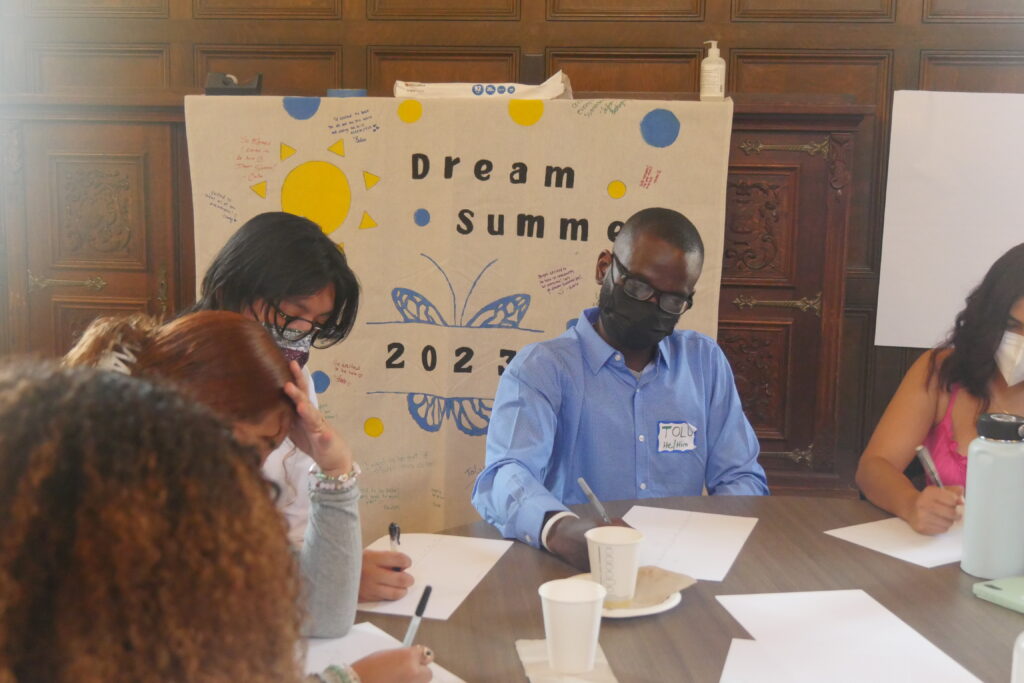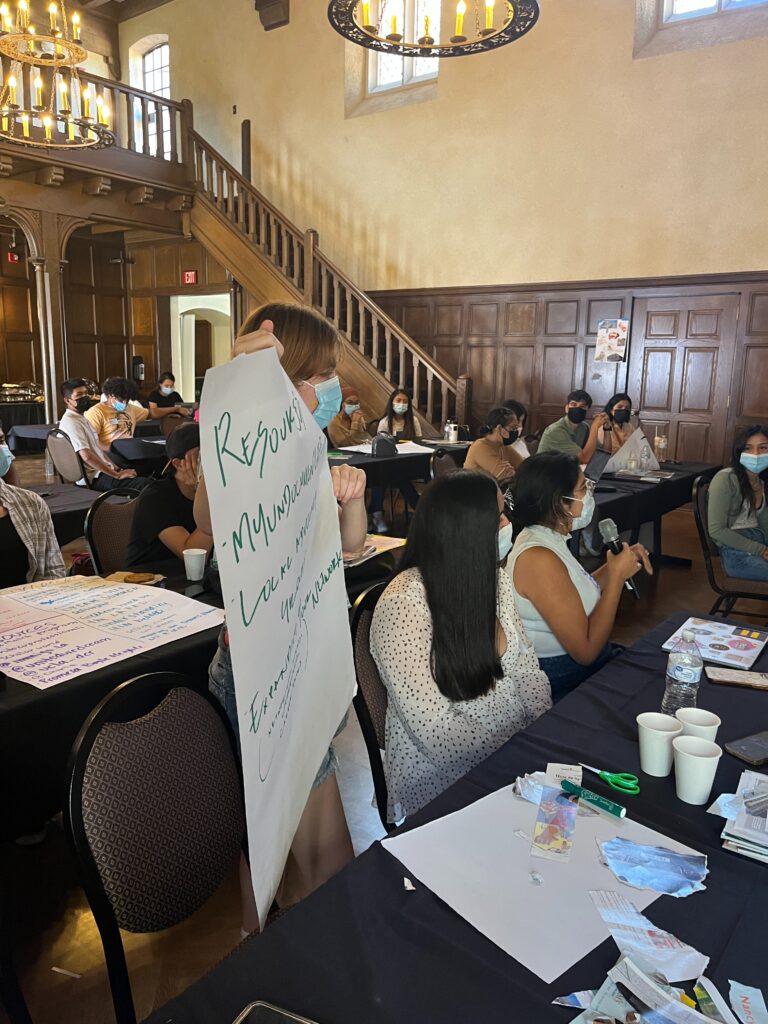Dream Summer
The Dream Summer fellowship program, housed in the UCLA Labor Center’s Dream Resource Center, positions immigrant youth as agents of change within the immigrant rights movement. Dream Summer provides a transformative space that challenges fellows to think critically about the intersecting issues impacting our communities, including social, economic, and racial justice. Through leadership development, advocacy training, and community building, immigrant young leaders are able to reflect on their unique strengths and recognize their inherent value as trailblazers for immigrant rights.

History
The national Dream Summer fellowship program, a project of the UCLA Labor Center’s Dream Resource Center, was launched shortly after the U.S. Senate failed to pass the federal DREAM Act in 2010. Driven by the leadership of immigrant youth, the first Dream Summer was launched in 2011 to provide talented emerging leaders with hands-on professional development opportunities in community organizations. The inaugural cohort of Dream Summer had 102 participants, who were placed in more than 80 labor and social justice organizations. Over the past 13 years, Dream Summer has built an alumni network of over 1,000 immigrant rights leaders.
How it works
The national Dream Summer Fellowship program empowers immigrant youth to become the next generation of social justice leaders through leadership development, movement building, and hands-on experience with mission-driven organizations. It creates safe and healing spaces for immigrant youth to connect, explore their identities, and build community. With an intersectional, cross-racial, and multi-generational approach, the Dream Summer fellowship addresses the diverse needs of immigrant communities.
Fellows are placed within social justice-based host organizations and work closely with their host organization to incorporate and strengthen the role of immigrant rights issues alongside the organization’s social justice work. Over the summer, fellows engage in and lead social justice efforts by aligning the call for immigrant rights alongside the unique challenges of queer and transgender communities, Asian and Pacific Islander communities, and Black immigrant communities. Additionally, they tackle concerns including the ongoing mass incarceration and criminalization of people of color, worker rights, and health care access for all.
Designed for individuals aged 18-28 with a demonstrated interest in the immigrant rights movement, the Dream Summer fellowship strongly encourages applications from undocumented youth, especially those who do not qualify for DACA, as well as LGBTQIA+, Black, AAPI, Indigenous, and others directly impacted by the immigration system. Fellowship placements are tailored to align with applicants’ interests, geographic location, and the needs of host organizations.
- December-January: Fellow applications open. The application process is rigorous; applicants must submit a completed application along with three essay prompts, a letter of recommendation, and an up-to-date resume.
- February-April: Application review and selection. A competitive selection process takes place from February to April, with fellows notified of their application status on a rolling basis from April through May.
- Late May – Early June: Virtual pre-orientation for fellows.
- Mid-June: Opening retreat and start of fellowships. Fellows attend an opening retreat in person or remotely, where they spend 2-3 days in Los Angeles building community with one another and receiving training in topics that prepare them for a successful fellowship with their host organizations, such as organizing, storytelling, and advocacy.
- June-August: Fellowships take place. Fellows work full-time for eight weeks, engaging in community work that spans across impact research, grassroot organizing, philanthropy work, policy, and political campaigns.
- Mid-August: Closing retreat. Fellows reunite in Los Angeles either in person or remotely to close their cohort cycle with a group celebration and workshops that will support them after the fellowship program, covering topics such as graduate school, independent contracting, and professional portfolios

Impact
The Dream Resource Center has provided over 1,000 fellowship opportunities to immigrant youth and allies across the past 14 years, awarding more than $1 million to fellows. Partnering with over 265 social justice organizations nationwide, the Dream Summer fellowship receives an average of 500-800 applications annually. In the last three years, the fellowship has prioritized immigrant young people outside of California who lack access to paid professional development opportunities, and today, 50% of our fellows reside out-of-state.
Notable Alumni
- Patrice Lawrence, Co-Founder of UndocuBlack (2016)
- Justino Mora, Senior Software Engineer at Emerson Collective, (2011)
- Ju Hong, Director of the UCLA Dream Resource Center (2011)
- Jose Patino, VP of Education & External Affairs at Aliento
- Bo Thai, Entrepreneur and Artist (2017)
- Anthony Ng, Program Officer at Weingart Foundation (2012)
- Madeleine Villanueva, Interim Director of Higher Education of Immigrants Rising (2015)
- Alan Pelaez Lopez, Professor (2012)
- Sydelle O’Brien, Special Projects Coordinator (2022)
- Eva Vera, co-created Effectively Supporting Black Undocumented Students Through Higher Ed (2024)
- Karely Amaya, USN (2021)
- Jeffry Umana Munoz, USN (2021)
- Abraham Cruz, USN (2021)
- Alejandra Serrano, USN (2021)
- Raheim Grant, Spotlight Grantmakers Concerned with Immigrant Refugees (2024)
- Deane Gumila, Student Government Association President of Texas A&M San Antonio (2023-24)
- Justine Lim, JD Candidate at UC Irvine School of Law, Co-Founder of Empowering API (2022)
- Abigail Gonzalez, JD Candidate at LMU (2019, 2022)
- Kevin Harrilall, New York State Leadership Council Consultant (2023-24)
- Christian Espinoza, Dream Summer Alumni Council 2022-2024, Founder of NavigatED (2022)
- Brenda Heredia, Small Business Owner of Quherencia (2021)
- Andrea Anaya, Dream Summer Mentor 2022 and 2024, Grad School Candidate at Carnegie Mellon University pursuing a Masters of Science in Public Policy and Management

Applicant Profile and Requirements
Applicants must:
- Be over 18 years old, or will be by the start of the program.
- We generally admit youth applicants from the ages of 18 to 28. We highly encourage individuals who do not qualify for DACA to apply.
- Have full-time availability for the summer (i.e., 32 hours per week).
- Have an active ITIN or SSN by the time their offer letter is received.
- Have demonstrated interest and/or experience working with the immigrants rights movement.
- Not have been an employee of the University of California within the last two years of the date of submission of the application, and cannot be a current employee. By “current,” we mean an on-going appointment with the University of California or plan to be employed during Dream Summer 2025. Being a University of California “employee” includes work-study and working on campus, i.e., working in student stores or restaurants/coffee shops. (***This rule does not apply to current UCLA students.)
We strongly encourage and prioritize applications from undocumented applicants who identify as LGBTQIA+, Black, API, and/or Indigenous, as well as other individuals directly impacted by the immigration system. We seek applicants who demonstrate and have a desire to be agents of change and uplift the immigrant community. Eligible applicants can be at the beginning of their journey within social justice, or have notable experience in advocacy spaces, but should be able to articulate the ways in which the program will support their goals. We seek applicants that can embody the following values and attributes:
An individual who takes into account the needs of the community, and is able to center those who are directly impacted by social inequities; someone who fosters meaningful connections with respect, consent, and a welcoming approach to different perspectives through knowledge-sharing.
An individual who embraces ongoing personal and professional development, and is willing to adapt and actively seek opportunities to expand their understanding of social inequities.
An individual who can analyze, deepen their understanding of, and pose questions about the underlying causes of social issues. Moreover, an individual who is driven to strategize and mobilize themselves and their community to create positive impact.
An individual who is willing to learn from their mistakes and able to be accountable for their actions. They are reflective of their role in advocacy, they respect the identities and experiences of those different from their own, and they seek to understand their own positionality.

Host Organizations
The Dream Summer fellowship partners with host organizations across the country, with the list of participating organizations varying each year based on the locations of accepted fellows. Host organizations play an active role in the fellow selection process by completing a host organization application, meeting with a Dream Summer program coordinator, and, if selected, submitting a work plan for their fellow.
The host organization application evaluates the organization’s interest in the Dream Summer fellowship, its work culture, and values, and provides a brief overview of the projects and responsibilities the fellow will undertake. Selected host organizations have previously offered fellows professional experiences such as leading campaigns, public speaking, writing memos, grassroots organizing, and conducting research.
Host organizations are chosen based on their demonstrated understanding of the needs of Dream Summer fellows and their commitment to providing meaningful leadership and professional development opportunities. The program prioritizes organizations that exemplify these qualities and commitments.
- Commitment to Active Youth Development
- Organizations must be committed to providing active mentorship throughout the duration of the program in order to develop their fellow’s professional skills within advocacy, providing an enriching experience that aligns with the fellow’s professional and personal goals.
- Strong Organizational Culture
- Organizations should foster a learning environment that is understanding of the unique experiences of fellows we work with, taking into consideration the challenges they have to navigate given their immigration status and intersecting identities. Their values are rooted in serving communities who are directly impacted by systemic issues and inequities.
- Active Partnerships
- The organization must be willing to engage and build connections with the rest of the Dream Summer cohort and DRC staff. They should communicate with fellows intentionally, provide constructive feedback to the fellow and program, and allow fellows to explore different career option learning opportunities within the organization structure.
Below are some of the host organizations the Dream Resource Center has worked with. Host Organization Partnerships change each year.
- Black Alliance for Just Immigration
- Garment Worker Center
- First Gen Empower (FGE)
- Convivir Colorado
- Colorado Immigrant Rights Coalition
- Illinois Coalition for Immigrant and Refugee Rights
- Woori Center
- Center for Immigration Law and Policy at UCLA School of Law
- Aliento Education Fund
- President’s Alliance
- Texas AFLCIO

Past Years’ Themes
Each fellowship year focuses on a theme that shapes our opening and closing retreats and is based on the current discourse happening in immigrant spaces, as well as the interests of the fellows as expressed through their applications.
- 2022: “The Immigrant Rights Movement Present and Future: Undocumented Liberation and Movement Building”
- Through this theme, we uplifted the intersecting issues impacting immigrant communities, as well as created a space for undocumented youth leaders to build community, address these issues, and share space of joy and self-preservation. One of the focus areas of the retreat was addressing burnout within organizing spaces and the importance of practicing boundaries and self-care.
- 2023: “Immigrant Rights Movement: Empowering a Collective Liberation”
- We uplifted the intersecting issues impacting our immigrant communities, discussed our identities beyond citizenship, and created a space for undocumented youth to build community.
- 2024: “Cultivating our Power: Resistance, Action, and Solidarity in the Immigrant Rights Movement”
- We fostered a space where fellows felt empowered, curious, and ready to engage in meaningful dialogue. During the retreat, we encouraged participants to reflect on what resistance means to them, how they currently embody it, and how they can further utilize it as young activists. Our workshops addressed the intersecting issues affecting our communities, drawing insights and lessons from the Black Liberation movement, and explored the connections between our liberation struggles and the ongoing genocide of Palestinian people.
Applications are now currently open.
More information about the fellowship below:
Dream Summer fellows receive a $7,000 fellowship award, leadership and professional development training, and become part of a national alumni network of close to 900 social justice leaders. Dream Summer is open to both experienced social justice leaders and those who wish to begin or strengthen their involvement in social justice. The Dream Summer Guide contains helpful information needed to help prepare for your application. Visit frequently asked questions for additional information about this fellowship.
The fellowship is open to all immigrant youth, regardless of immigration status (undocumented youth, youth with DACA or TPS, etc. are all welcome to apply). Applicants do not need to be students at UCLA to qualify for the fellowship.
Application Deadline: December 19th, 2025 by 12PM (NOON) PST
For Dream Summer 2026, the DRC is seeking to partner with organizations that address issues intersecting with the experiences of immigrant youth such as educational access, health, labor, mass incarceration and deportation, and the unique experiences of Asian and Pacific Islander, Black, Muslim, and LGBTQ+ undocumented communities.
